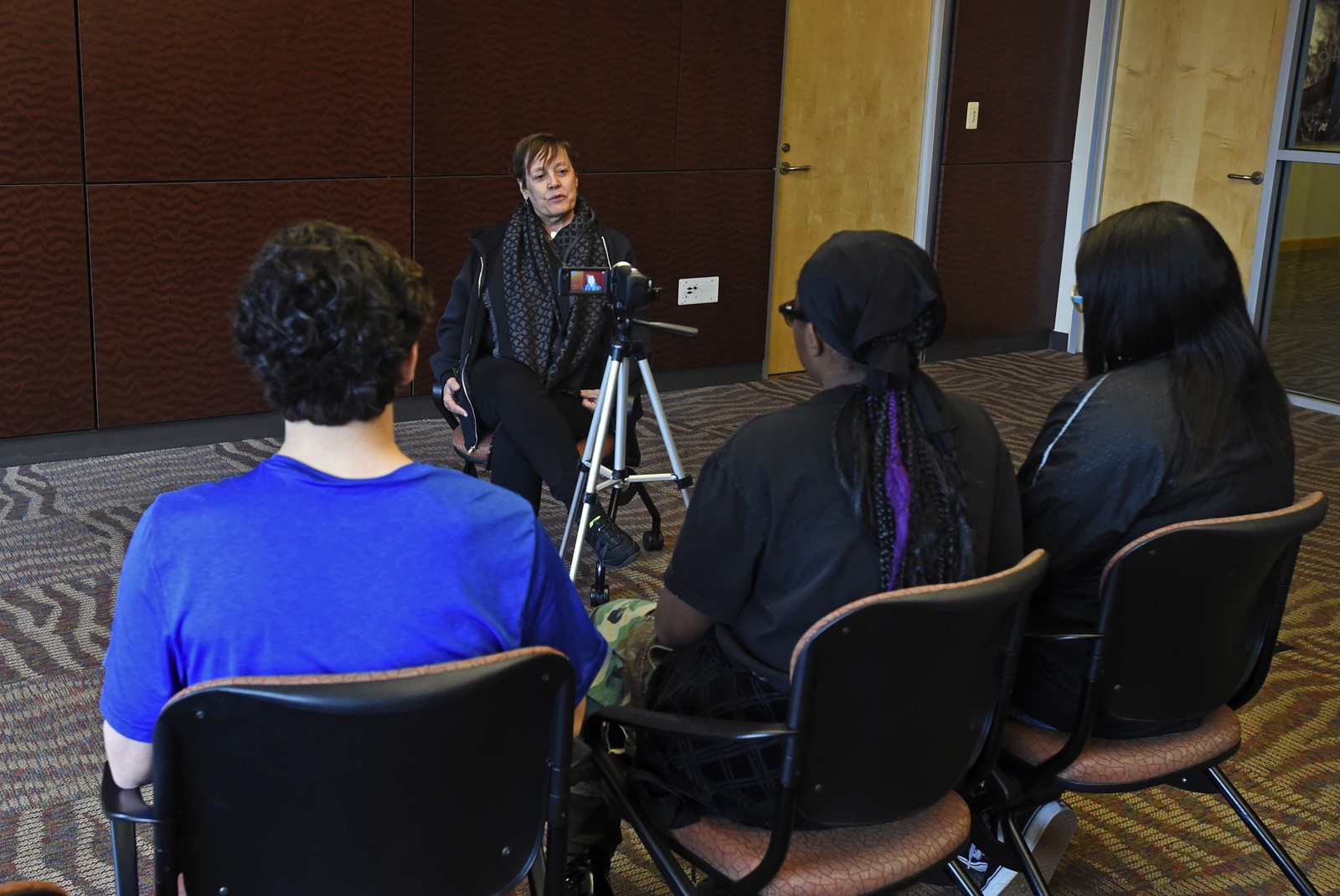Area students use video
to explore civil rights era
Project pairs mostly black public school from Baltimore and mostly white private school from Baltimore County

Lydia Wilkins was 11 years old when she helped integrate the formerly whites-only Gwynn Oak Amusement Park in Baltimore County.
“Was your mother ready for you to take that step in the civil rights movement?” Anisa Haughton, a sophomore at City Neighbors High School, asked Wilkins at the Reginald F. Lewis Museum of Maryland African-American History and Culture.
Students from City Neighbors and the Park School of Baltimore are exploring the ways the civil rights era unfolded locally. They are interviewing civil rights veterans and visiting the places in their own neighborhoods where history happened. The five-week project launched on April 4 — the 50th anniversary of the assassination of the Rev. Martin Luther King Jr.
“When people think of the civil rights movement, they concentrate on the deep South,” said City Neighbors math teacher Rodney Wallace, one of the project organizers. “But there was activism everywhere, including here in our back yard. This is about giving kids the chance to make connections to history and to home.”
The program is in its first year, and intentionally a collaboration between a public charter school in the city and a private school in Baltimore County. School officials say it’s important to bring students from different backgrounds together to learn about the circumstances that shaped their lives. The majority of City Neighbors students are black. The majority at the Park School are white.
“For this project, we all integrated,” Haughton said.
The lessons are taking place over a succession of Wednesdays, to culminate in a presentation of student-produced documentaries about the experience.
Ten students spent a day last week at the Lewis museum and recorded interviews with Wilkins and others who integrated local schools, joined Freedom Rides and marched on Washington.
Their teachers hope the students come away feeling that the civil rights movement isn’t just a moment in history, but rather a continuing struggle for equality.
Leo Burroughs Jr., 76, organized Freedom Riders — groups that integrated segregated buses — on Maryland’s Eastern Shore.
“I am not pessimistic or cynical to the extent that I believe America is beyond redemption or change,” he said. “But I am saying to you, young people, we have to be persistent. We can and will overcome, with your determined help.”
Charles Mason, another activist during the civil rights era, said young people have historically been drivers of social change. He pointed to Emma González, the survivor of the school shootings in Parkland, Fla., who has emerged as a powerful advocate of gun control.
“During the civil rights movement, most of us were young,” Mason, 79, said.
The Baltimore Civil Rights Experience was designed in part to complement another program in which the two schools participate: an annual civil rights trip. For years, a joint group of students has traveled across the South during the week of King’s birthday. They visit the sites of lynchings, speak with figues of the era and walk through historic sites of unrest.
“I’ve never met a student who doesn’t come back from the trip profoundly changed,” City Neighbors English teacher Sean Martin said.
“We wanted to create something here that could also be a profound experience but might not require quite that funding level and could involve more students.”
Rachael Devecka, a junior at Park, went on the civil rights trip this winter, and is now part of the five-week program. She said she wanted to continue building on the lessons she learned in January.
Before the weeklong journey through history, the 17-year-old said, she was complacent about some social justice issues.
She says she didn’t participate in the Black Lives Matter protests that followed the death of Freddie Gray in 2015, and missed the Women’s March in Washington last year.
But that’s changed since she returned to school from the January trip.
She participated in the March for Our Lives in Washington and the nationwide school walkout last month to protest gun violence. She serves on the Park School’s committee for diversity and inclusion.
“The civil rights movement was a youth-fueled movement,” she said. “I’m not putting activism on hold and waiting for my life to start.”


